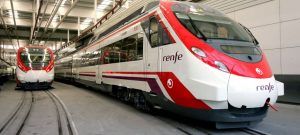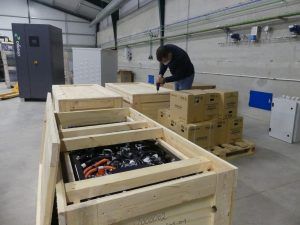 Toyota Motor Europe has delivered a first batch of fuel cell modules to Spain’s national hydrogen and fuel cell technology testing centre, Centro Nacional del Hidrogeno (CNH2) for applications in rail transport.
Toyota Motor Europe has delivered a first batch of fuel cell modules to Spain’s national hydrogen and fuel cell technology testing centre, Centro Nacional del Hidrogeno (CNH2) for applications in rail transport.
The modules will be used in a demonstration train which forms part of the testing phase of the European FCH2Rail project, which will allow electric trains to switch to hybrid, emission-free running when overhead power lines are not in place. Introducing such bi-mode trains would help phase out the use of diesel locomotives.
To date, Toyota has built and tested six fuel cell modules, each based on the second – generation hydrogen fuel cell found in Toyota’s latest Mirai saloon car. This unit is more compact and more powerful than its predecessor and has helped Mirai to achieve a 30 per cent greater driving range.
The Hydrogen and Fuel Cell Technology Experimentation National Center will bench-test three modules paired with powertrain batteries before sending all six fuel cells to CAF in mid-February, for installation in the demonstration train.
 The final testing involves the incorporation of Toyota’s fuel cell modules into a Fuel Cell Hybrid Power Pack that can combine electricity supplied from an overhead line with a hydrogen fuel cell module and battery. This pack will operate independently to power the train when required. The compact, flat module configuration designed by Toyota will allow the units to be integrated in the roof of the train for optimum packaging.
The final testing involves the incorporation of Toyota’s fuel cell modules into a Fuel Cell Hybrid Power Pack that can combine electricity supplied from an overhead line with a hydrogen fuel cell module and battery. This pack will operate independently to power the train when required. The compact, flat module configuration designed by Toyota will allow the units to be integrated in the roof of the train for optimum packaging.
Once integration testing is complete, initial functional tests and trial runs will take place as part of the approval process for Spanish and Portuguese rail lines.
In April, Toyota won the contract to deliver the fuel cell modules for the hydrogen pilot project consisting of the transformation of a Civia electric commuter train into a mi-mode train to offer an alternative to conventional diesel locomotives. FCH2Rail project aims to test the energy management technology in the hybrid set-up to ascertain whether it can be a reliable and viable solution for hydrogen zero emissions trains. The EUR 14 million FCH2Rail project is funded by Fuel Cells and Hydrogen Joint Undertaking (FCHJU).
Share on:



